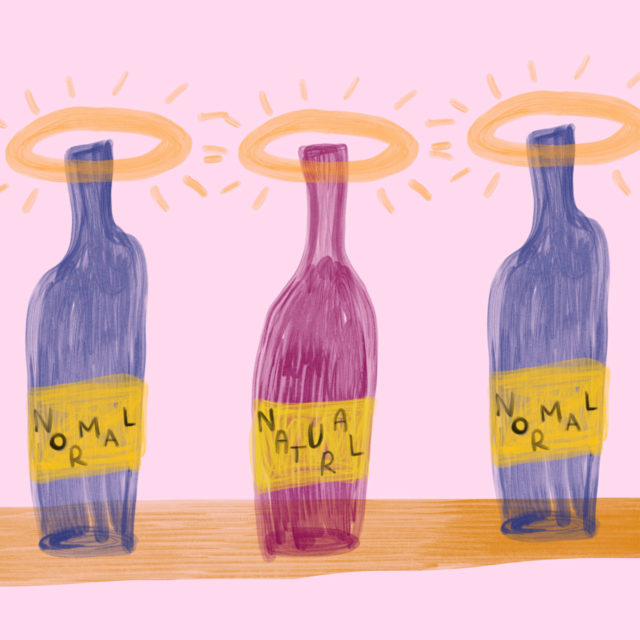Everything is wellness and wellness is everywhere — including, now, in the world of wine.
On June 3, 2019, The New York Times published an essay titled “Natural Wine Is My Self-Care.” Unfortunately, the widely shared, beautifully written piece contains certain inaccuracies, conflating all natural wines with Pét-Nat, for example, and mischaracterizing their consistency.
More alarmingly, however, the essay reinforces a pervasive, categorically incorrect notion that has been rippling through wellness- and wine-adjacent circles ever since natural wine began its meteoric rise in the United States several years ago. Namely, that natural wine is somehow medically, morally, and spiritually superior to traditionally produced juice.
“We have a responsibility to not overplay [natural wines’] supposed healthiness,” says Tom Natan, owner of First Vine, a Washington, D.C.-based importer and retailer. “Choose what you like best, but don’t do it because one’s healthier.”
The complicated term “natural wine” has no official regulation in the United States, but is generally defined as wines made without additives, using minimal sulfites and usually organic fruit. However, natural wine does not contain more “health benefits” than traditional wine, and is no less likely to cause a hangover.
No alcoholic beverage is healthy. While some of it may be less bad for you than others, no alcohol is inherently good for you. Not triple-distilled vodka, not veggie-based cocktails, not low-calorie beer. Not even natural wine.
Purporting otherwise is untrue, of course, and risks fragmenting the wine community, a group already beset by notions of exclusivity. By positioning natural wine within an aspirational world of wellness, we risk making it less accessible to drinkers curious about wine and hesitant to say or do the “wrong” thing.
As the spirits and cocktail writer Kara Newman touched upon in March 2019, there’s an alarming rise in wellness drinks being marketed to us. This is, in part, due to brands trying to win over millennials who value healthy living with products associated with the buzzy W word: wellness. That natural wine is now being co-opted by the wellness movement is troubling, and dangerous for consumers.
“I enjoy quite a few of the wines that fall into the nebulous category of natural wine,” Lenn Thompson, a wine writer and editor of the Cork Report, says. “I’m not a nutritionist or a doctor, but touting any wine or wine-adjacent product as ‘healthy’ or healthier than any other similar beverage is just marketing bullsh*t. It’s also probably illegal.”
Earlier this year, when Kourtney Kardashian unveiled her new e-commerce and lifestyle website Poosh, it recommended several “organic wines” (many of which can be called natural wine) to followers, claiming that they are “better for your body.”
Gwyneth Paltrow’s mega wellness brand, Goop, also advocates for natural wines, and spreads the message that you can drink more without getting a hangover. “If you ask people who have converted to drinking natural wine, they’ll tell you that they feel much better in the morning than they used to!”
This sort of propaganda simply isn’t accurate. Plenty of people drink natural wine and so-called “standard” wine, and have experienced hangovers after both (this author included).
There are also plenty of traditional producers in places like Burgundy, the Loire Valley, and Austria that have made organic, Demeter-certified wine for centuries. Because they are not cloudy and unfiltered or packaged with hip, edgy labels, these wines are not positioned as “natural” by those marketing wine to American millennials.
New-wave natural wine enthusiasts are adding a privileged value to natural wines: that they’re better for your body, and therefore more virtuous, more pure. Moving natural wine toward the wellness market — positioning it as more of a lifestyle brand than an alcoholic beverage — is potentially disastrous for wine. By spreading the idea that it’s better than all other wines, natural wine enthusiasts are ironically engaging in the same elitist mentality that the movement formed in opposition against.
If you want to drink natural wine, you should. It can be delicious! Just don’t do so under the guise of ideological or physical superiority. Wine is not a wellness beverage — not standard wine, and not natural wine. It doesn’t need to be, either.
